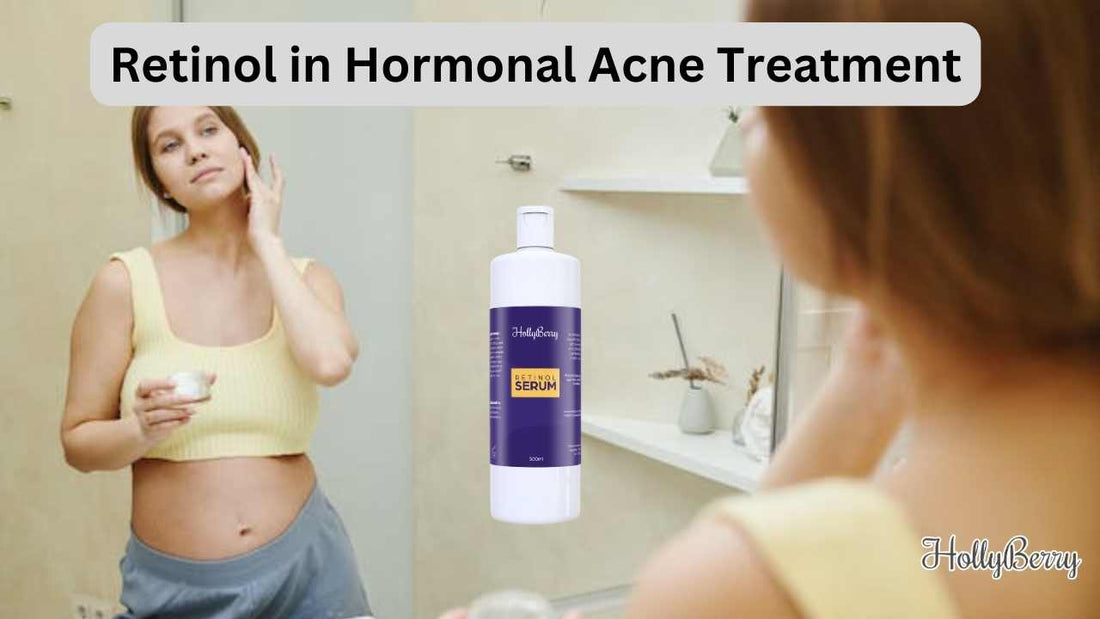
Retinol in Hormonal Acne Treatment
Share
A Potent Solution Explained

Retinol, derived from vitamin A, has emerged as a powerful acne treatment option with promising results. It works by regulating skin cell turnover and reducing inflammation, which helps prevent the clogging of hair follicles and the development of acne lesions.
Furthermore, retinol has been proven to be effective in addressing both hormonal and non-hormonal acne due to its action on the primary lesions and its interaction with nuclear hormone receptors and binding proteins.
Topical retinoids, such as tretinoin, have been widely used in treating various forms of acne. Combined with other treatments like topical antimicrobials, a tailored approach involving retinol can significantly improve skin appearance and reduce the severity of acne.
It is crucial to consult a dermatologist before starting a retinol-based treatment, as concentrations and formulations may vary, requiring professional guidance to ensure optimal results and minimise potential side effects.
Understanding Retinol and Its Role in Hormonal Acne
Mechanism of Retinol in Skin Health
Retinol, a derivative of vitamin A, is a crucial component in maintaining skin health. It plays a vital role in promoting cell turnover, regulating oil production, and stimulating collagen synthesis. As a result, it improves skin texture, unclogs pores, reduces inflammation, and diminishes the appearance of acne.
The mechanism by which retinol works is through its interaction with specific nuclear hormone receptors, such as retinoic acid receptors (RAR) and retinoid X receptors (RXR). This interaction regulates gene expression, leading to the various beneficial effects of retinol on the skin.
Order here
Specifics of Retinol for Hormonal Acne
Hormonal acne, often affecting women, occurs due to fluctuations in hormones, such as androgens, which can lead to increased oil production and inflammation in the sebaceous glands. Retinol tackles hormonal acne by addressing these underlying issues.
- Oil production reduction: Retinol helps regulate sebum production in the sebaceous glands, preventing the accumulation of excess oil in the pores that can lead to acne breakouts.
- Improved cell turnover: By promoting cell turnover, retinol aids in the removal of dead skin cells that can clog pores and contribute to acne formation.
- Inflammation reduction: Retinol possesses anti-inflammatory properties that help decrease the redness and swelling often associated with acne breakouts.
Comparison with Other Topical Retinoids
There are various types of topical retinoids available for acne treatment, with tretinoin and adapalene being two of the most common. While all retinoids share certain characteristics, they also have distinctive features that can influence their suitability for different individuals.
| Retinoid | Efficacy | Safety | Potential Side Effects |
|---|---|---|---|
| Retinol | Moderate | High | Mild, e.g., dryness, irritation |
| Tretinoin | High | Moderate | More pronounced, e.g., peeling, redness |
| Adapalene | High | High | Milder than tretinoin, e.g., dryness, irritation |
While retinol offers a milder option with fewer side effects compared to prescription-strength tretinoin, its efficacy may be lower. Adapalene, on the other hand, provides a similar level of efficacy as tretinoin but with a gentler profile and is more suitable for sensitive skin. The choice of topical retinoid depends on an individual's skin type, acne severity, and personal preferences.
Practical Considerations and Usage Guidelines
Application Protocol and Product Selection
When choosing a retinol product for hormonal acne treatment, it is essential to consider the various available formulations, such as gels, creams, serums, and lotions. Over-the-counter (OTC) retinol products typically contain lower concentrations of the active ingredient, which makes them a suitable starting point for individuals new to retinoid-based treatments.
Prescription-strength options like tretinoin and isotretinoin offer higher concentrations and may be necessary for more severe cases.
The chosen retinol product should ideally be combined with other essential skincare ingredients, such as benzoyl peroxide, salicylic acid, and niacinamide. It is useful to develop a skincare routine that includes a suitable cleanser, moisturizer, and sunscreen to protect the skin. A simple guideline for incorporating retinol into your routine is:
- Cleanse: Gently wash the face with a mild cleanser.
- Treat: Apply the retinol product on the affected areas, taking care to avoid sensitive regions like the eyes and mouth.
- Moisturise: Use a non-comedogenic, fragrance-free moisturizer containing hyaluronic acid or other hydrating agents.
- Protect: Apply a broad-spectrum sunscreen with a minimum SPF of 30 during the day.
Managing Side Effects and Skin Sensitivity
Retinol treatment may cause initial side effects such as dryness, flaking, redness, and tenderness. It is crucial to introduce retinol gradually, starting with a low concentration and progressively increasing the application frequency.
For example, consider applying retinol every third night for the first two weeks, then increasing to every other night for the following two weeks.
To mitigate side effects, use retinol alongside soothing actives like antioxidants and niacinamide. Moreover, avoid using physical scrubs or exfoliants, as these may exacerbate skin irritation.
Pregnant women and those undergoing menopause should consult their healthcare providers before incorporating retinol into their skincare routine, as hormonal fluctuations may impact its efficacy and suitability.
Long-term Efficacy and Skin Care Integration
Consistent use of retinol in conjunction with other acne-fighting ingredients like benzoyl peroxide and salicylic acid typically yields significant improvements in hormonal acne.
However, it is important to remember that retinol's effects are cumulative, and noticeable results may take several weeks to months to appear. Patience and consistency are key for achieving optimal benefits.
In the long term, retinol users are likely to notice not only a reduction in acne but also improvements in skin texture, hyperpigmentation, acne scarring, and signs of ageing such as wrinkles.
To maintain these results and support overall skin health, consider integrating retinol into a comprehensive skincare regimen that addresses specific concerns like excess sebum production, clogged pores, and skin sensitivity.
Additionally, maintaining a balanced diet, managing stress, and protecting the skin from environmental damage can further enhance retinol's effectiveness in treating hormonal acne.

